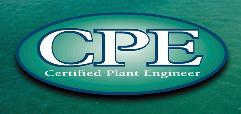|
CPE Certification

Certified Plant Engineer FAQs
If you’re serious about not just your job, but your
career, one of the best ways to distinguish yourself is by
earning the well-known professional designation offered by
the Association for Facilities Engineering. Our program for
becoming a Certified Plant Engineer (CPE) is highly
respected because it is very thorough and demanding. Once
you’ve earned your CPE designation you have joined an
elite corps of personnel; you are part of a group of
facilities professionals who have proven their knowledge and
competence. Here’s another good reason: Facilities
Engineering Journal reported that plant engineers who
achieve the CPE designation earn $2,500 to $3,500 more than
their non-certified colleagues. Many people are unfamiliar
with what the program involves. AFE's Certification Manager
Jennifer Gonzalez offers the following facts:
| Am I eligible? |
You are eligible if either
- You are a degreed engineer (meaning you have a four-year
bachelor degree) with six years of experience inplant/facilities engineering,
or four years of management-level experience in plant/facilities
engineering or
- You don’t have a degree but do have eight years of
experience in plant/facilities engineering or six years of management-level
experience in it. (Note: If you are a licensed Professional Engineer you
are exempt from the exam but still must submit documentation
to AFE to be awarded the CPE designation.)
|
| Do you have to be an AFE member to take the test? |
No. However, exposure to many
resources available to AFE members certainly enhances your knowledge of the
facilities engineering field. |
| What does the exam cover? What is it like? |
The exam — which you have up to eight hours to complete
— has 100 multiple-choice questions that cover electrical,
civil, mechanical, environmental, maintenance, economics,
management, HVAC, OSHA, controls and instrumentation and
energy topics. About half of the exam is made up of the
electrical, civil and mechanical engineering portions. A
score of 67 is required to pass. |
| How can I prepare for the exam? |
AFE offers a CPE Review Pak, which covers the 11 topics
contained in the test. Also, there are three national review
programs a year. The average passing rate of the
participants who take the national review program is about
70%; vs. 50% for those who don’t. |
| Where is the exam given? |
You can take the CPE exam at either (1) a national review
program site or (2) At your own workplace, using a proctor
from your employer's human resources or personnel office.
With either choice, grading is done by AFE staff at the
national headquarters office. |
| If I fail, can I take the exam again? |
Yes. |
| If I pass, what happens? |
Several things. You will be notified by AFE’s
certification department — and so will your boss. We do
this because we think you deserve congratulations and your
boss deserves to know what you have achieved to become a
more valuable employee. Also, you will receive a
certificate, a CPE identification card and a CPE lapel pin. |
| Is my certification good for life or does it expire? |
You must earn at least eight re-certification credits every
five years. Five of those credits come simply from being
continuously employed in the facilities engineering field. |
| Who governs the program? |
AFE's certification board members,
all CPEs or PEs, oversee the program. They are all leaders in their fields of
expertise. |
| How do I find out more? |
Call AFE — (513) 489-2473 — and speak with Jennifer
Gonzalez (ext. 19). She can provide you with the proper application forms, the Review Pak, and
other information. She also can be contacted by e-mailing
jgonzalez@afe.org. |
CPE Now Offered in Four Modules
Applicants for AFE’s distinguished, 24-year-old Certified
Plant Engineer program now can elect to pursue the CPE
credential the traditional way — learning and being graded
upon the entire, 10-discipline curriculum at once — or in
four stages, with groups of topics at a time. The
traditional exam has 100 multiple-choice questions that
cover electrical, civil, mechanical, environmental,
maintenance, economics, management, HVAC, OSHA, controls and
instrumentation and energy topics. Applicants have up to
eight hours to complete the exam; a score of 67 is required
to pass. A newly credentialed CPE earns a certificate, a
special identification card and a lapel pin. The new option
presents the CPE program in four, equally weighted modules
that can be tackled separately:
- civil engineering, economics and management
- environmental engineering, safety and maintenance
- mechanical engineering and HVAC matters
- electrical engineering (which
includes the topics controls / instrumentation and energy)
Applicants who choose the new method earn the title,
CPE-in-Training (CPE-IT) as they successfully complete each step. They have
up to five years to complete all of the modules, then they
are fully credentialed CPEs, just like their colleagues who
studied and were tested on all topics at once, Certification
Manager Jennifer Gonzalez said. "The module format was
created to make CPE training more accessible to
people," Gonzalez said. "Our certification board
identified the need for people to concentrate on certain
areas of the curriculum more than others. With this
innovation, some people can choose to pace themselves more
conveniently, and stagger their investment in the
program." No content of the curriculum will be
compromised; the knowledge required to pass in either the
traditional or modules format will be the same, Gonzalez
said. The number of questions in each of the modules’
tests may differ from one another, but not from the
traditional test, she said. Eligibility requirements to
participate in the program are unchanged, too. Anyone can
participate in CPE training if they:
 | Are a degreed engineer
(meaning you have a four-year bachelor degree) with six
years of experience in plant/facilities engineering, or four
years of management-level experience in plant/facilities
engineering; or |
 | Don’t have a degree but do have eight years of
experience in plant/facilities engineering or six years
of management-level experience in it. (Note: If you are a
licensed Professional Engineer you are exempt from the exam
but still must submit documentation to AFE to be awarded the
CPE designation.) |
As in the past, applicants can attend a CPE review course and be
tested under proctored conditions at their workplaces or at one of AFE’s events.
To maintain the credential, a CPE must earn at least eight re-certification credits every five
years. Five of those credits come simply from being continuously employed in the facilities
engineering field.
Since 1976, AFE has awarded the CPE credential to over 4,500 people. Applications,
review materials, and order forms for the popular new handbook, "Facilities
Operations & Engineering Reference" can be obtained by calling (513) 489-2473 or
contacting Gonzalez at jcoleman@afe.org.
More information can be obtained from our web page,
www.afe.org, also.
"Clearly, our CPE program is the standard-bearer for success in
the facilities engineering field," Certification Board Chairman Emeritus Richard
M. Sovic, PE, CPE, REM, said. "We hope that in the long run, more and more busy
professionals will be able to participate in it now that the four-part modules system has
been established." The modules system does not apply to AFE’s newer credential program,
Certified Plant Maintenance Manager.
|
|
 

 |
Advertise |
 |
Advertise with AFE Region
IV
Region IV has hundreds of key decision-makers in commercial and
industrial locations in its membership. Sponsors can advertise a number of ways: Banner ads on individual pages,
one-time ads for special events or full-page ads.
More
Information
|
 |
 |
|
|

